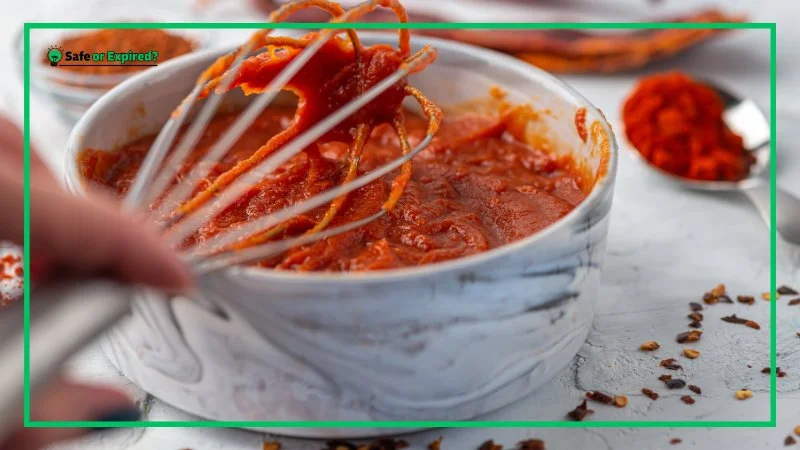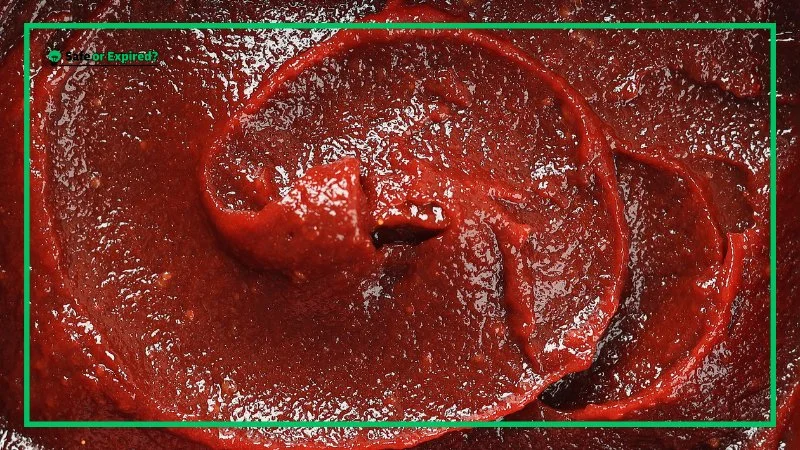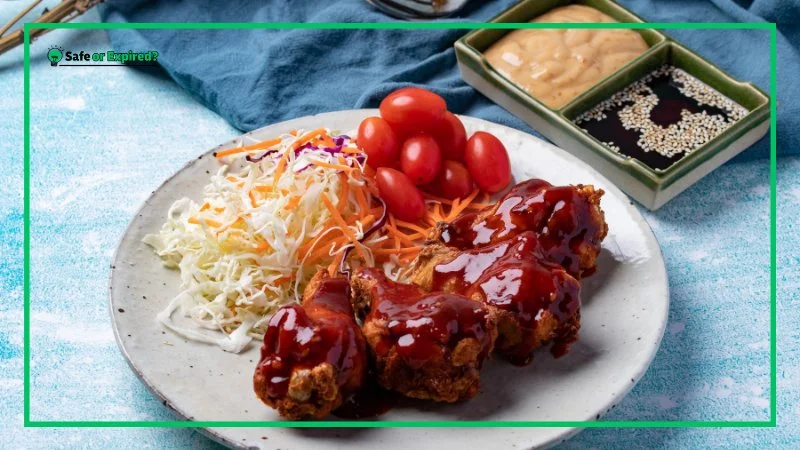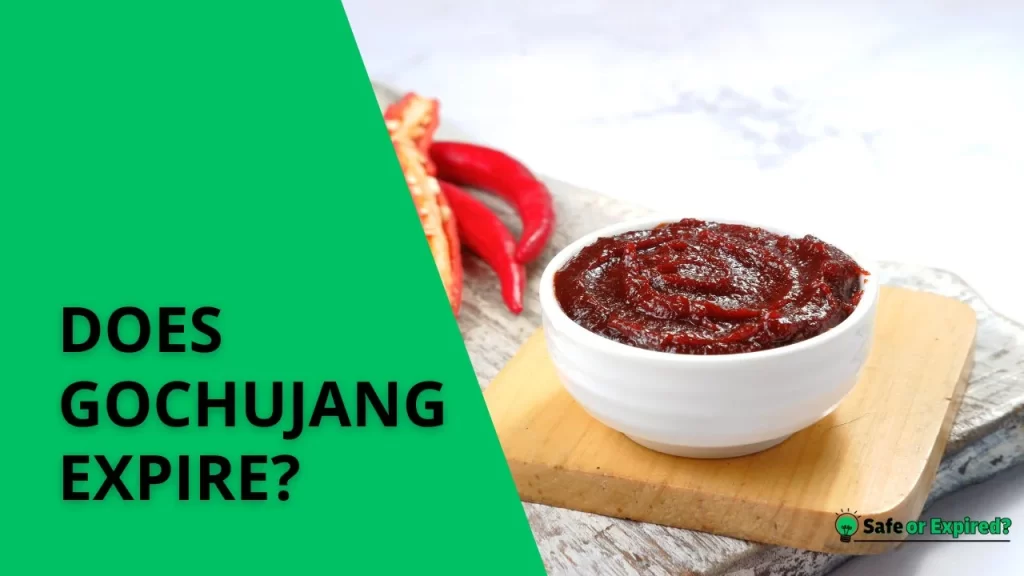“Does Gochujang expire?” is one of the most common questions chefs ask, and the answer is yes. Gochujang can go bad after some time, which is why you must always look for the signs of spoilage. But worry not; here, we will explain the expiration and offer insights into proper storage that will keep this condiment fresh for a long time. Continue reading!
Does Gochujang Expire? Understanding its Shelf life
Yes, Gochujang does expire, however it boasts a long shelf life, thanks to its fermentation process. A sealed container of Gochujang can last up to two years unopened, and even after opening, it remains good for about a year if stored properly.
Let’s look at which things impact the Gochujang expiry.
Ingredients Making Up Gochujang
The answer to the question “How long does Gochujang expire?” depends on the ingredients. Gochujang is a blend of red chili powder, fermented soybeans, glutinous rice, and salt. They are the reason behind the rich, complex taste. These ingredients also have a longer shelf life.
In addition, some Gochujang varieties may contain preservatives that extend their shelf life. Natural preservatives, like salt, are commonly used in Gochujang.
The Impact of Fermentation on Gochujang’s Shelf Life
Fermentation is the heart of Gochujang’s longevity. This traditional process acts as a natural preservative.
However, it’s important to note that while fermentation extends shelf life, it doesn’t make Gochujang immune to spoilage under improper storage conditions.
Storage Conditions
The way Gochujang is stored significantly affects its longevity. It should be kept in a cool, dark place before opening and refrigerated after opening. Exposure to heat, direct sunlight, or fluctuating temperatures can accelerate spoilage.
Read more about Food Storage and Preservation Techniques.

You might be wondering, “Does Gochujang go bad if not refrigerated?” Well, yes. Cool temperatures can slow down the spoiling process.
Here’s a table to clear things up about Gochujang’s expiry in different places:
| Storage Location | Opened Gochujang | Un-Opened Gochujang |
| Counter | Not Recommended (will get spoiled in days) | Not Recommended (will get spoiled in days) |
| Fridge | 1-2 years | Up to 2-3 years |
Packaging
The type of packaging can also influence Gochujang’s shelf life. Air-tight, sealed containers are best for preventing the introduction of contaminants and moisture.
Once opened, exposure to air can introduce bacteria or mold and can also dry out the paste, affecting its texture and flavor. Keeping the paste tightly sealed when not in use helps prolong its shelf life.
Contamination
Using unclean utensils to scoop out the paste can introduce bacteria into the Gochujang, leading to spoilage. It’s important to use clean utensils each time to maintain their quality.
The question now is, “How long is Gochujang good for after expiration date?” Well, until you start noticing extreme signs of spoilage.
What Are The Signs of Expired Gochujang? Top 5
The biggest sign of expired Gochujang is the change in color. It can become brown when spoiled. In addition, it will also start to smell foul and develop mold. In some cases, you will also see a change in texture. Another indication of spoilage is a change in taste.
Change in Color
Gochujang has a deep red color, which signifies its freshness and potency. Over time, exposure to oxygen and light can cause the color to fade or darken significantly. A noticeable change in color, such as becoming brownish or unusually dark, is a sign that the Gochujang may have started to deteriorate.
Development of Mold
The presence of mold is one of the most obvious signs that Gochujang has expired. Mold can appear on the surface in various colors, including white, green, or black. If you notice any mold growth, it’s crucial to discard the entire container. If you don’t, the mold spores can spread throughout the paste.
Off-smell
Fresh Gochujang has a distinct spicy and slightly fermented aroma. If your Gochujang starts emitting an unpleasant, sour, or otherwise off smell, it’s a strong indicator that it has gone bad. A rancid or foul odor is a clear sign that the Gochujang should not be consumed.
Change in Texture
The texture of Gochujang should be smooth and paste-like. Over time, it may either dry out, becoming hard and crumbly. Sometimes, it can also become too liquidy or slimy.

Taste Alteration
Tastling should be the last resort after checking for other spoilage signs, but a noticeable change in the flavor profile of Gochujang indicates spoilage. It may taste excessively sour, bitter, or just “off.”
| Sign of Spoilage | What to Look For |
| Color Change | Fading to brownish or an unusually dark color |
| Mold | White, green, or black spots on the surface |
| Off-smell | Unpleasant, sour, or rancid odors |
| Texture Change | Becoming too hard, crumbly, slimy, or liquidy |
| Taste Alteration | Excessively sour, bitter, or off flavors |
If you encounter any of these signs, it’s safest to discard the Gochujang to avoid the risk of foodborne illness. Also, always ensure to store Gochujang properly to maximize its shelf life and maintain its quality.
Read more about Common Signs of Spoilage.
How to Store Gochujang Properly to Maximize the Shelf Life?
To store Gochujang properly to maximize shelf life, focus on keeping it safe from contaminants. Keep it in an airtight container and don’t let sun rays fall on it. Moreover, always use clean utensils and ensure no moisture affects its taste.
Before Opening
“Does Gochujang expire if unopened?” is a common query and the answer is yes. However, if you store it correctly, it won’t get spoiled quickly. Ensure the following and you’ll notice a difference.
- Cool, Dark Place: Keep unopened Gochujang in a cool, dark place, such as a pantry or cupboard. This prevents premature fermentation or spoilage caused by heat and light.
- Upright Position: Store the container in an upright position to prevent leakage and to keep the seal intact. This reduces the risk of air entering the container.
After Opening
After opening, consider these things;
- Refrigeration: People often ask, “Does Gochujang expire in the fridge?” Yes, but slowly. Once opened, Gochujang must be refrigerated to slow down the fermentation process and prevent spoilage. The low temperatures help maintain its quality and extend its shelf life.
- Airtight Container: You should put Gochujang in an airtight container. This prevents the paste from drying out and reduces exposure to air, which can introduce contaminants.
- Use Clean Utensils: Always use clean, dry utensils when scooping out Gochujang.

Additional Tips
- Check Regularly: Periodically check the Gochujang for signs of spoilage, such as color change, an off smell, etc. If any of these signs are present, it’s best to discard the paste.
- Avoid Cross-Contamination: Keep the Gochujang away from raw foods in the refrigerator to prevent cross-contamination.
- Label the Container: Write the opening date on the container. This helps you keep track of how long the Gochujang has been open and assess its quality over time.
By following these storage guidelines, you can help ensure your Gochujang remains flavorful and safe to consume.
This curiosity extends beyond just condiments. For those who enjoy baking, the question of whether cake mixes expire and if they can still be used past their best before date is equally important. “Can I Use an Expired Cake Mix?” offers insights into this common query.
FAQ
How Long Can Gochujang Last After Opening?
Properly stored in the refrigerator, opened Gochujang can last up to a year while maintaining its quality and flavor.
Can I Freeze Gochujang To Extend Its Shelf Life?
Freezing is not recommended to extend Gochujang’s shelf life as it can alter the texture and flavor. However, you can still store it in the freezer if necessary. Remember to thaw it in the refrigerator before use.
Is It Safe to Eat Expired Gochujang?
No, it’s not safe to eat expired Gochujang. If it shows signs of spoilage like mold or an off-smell, you should discard it, as it could lead to foodborne illnesses.
How Can I Tell If My Gochujang Is Still Good To Use?
Good Gochujang should have a vibrant red color, a smooth paste-like texture, and a pungent, spicy smell. Any deviation from these characteristics may indicate spoilage.
Conclusion
Gochujang can expire and we discussed it in detail here. Here are the key points to summarize everything we’ve explained:
- Gochujang has a long shelf life, owing to its fermentation process.
- You can extend Gochujang’s shelf life with proper storage.
- Keep looking for sudden changes in color, texture, and smell to identify spoilage.
- High-quality ingredients contribute to both the flavor and longevity of Gochujang.
Remember to consume Gochujang fresh and dispose of it whenever you think it has started to spoil. There’s nothing more important than staying healthy and eating fresh!

